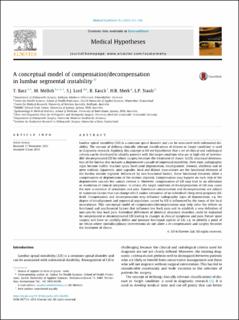Please use this identifier to cite or link to this item:
https://doi.org/10.21256/zhaw-1623| Publication type: | Article in scientific journal |
| Type of review: | Peer review (publication) |
| Title: | A conceptual model of compensation / decompensation in lumbar segmental instability |
| Authors: | Barz, Thomas Melloh, Markus Lord, Sarah J. Kasch, Richard Merk, H.R. Staub, Lukas P. |
| DOI: | 10.21256/zhaw-1623 10.1016/j.mehy.2014.06.003 |
| Published in: | Medical Hypotheses |
| Volume(Issue): | 83 |
| Issue: | 3 |
| Page(s): | 312 |
| Pages to: | 316 |
| Issue Date: | Sep-2014 |
| Publisher / Ed. Institution: | Elsevier |
| Publisher / Ed. Institution: | Amsterdam |
| ISSN: | 0306-9877 1532-2777 |
| Language: | English |
| Subject (DDC): | 616: Internal medicine and diseases |
| Abstract: | Lumbar spinal instability (LSI) is a common spinal disorder and can be associated with substantial disability. The concept of defining clinically relevant classifications of disease or ‘target condition’ is used in diagnostic research. Applying this concept to LSI we hypothesize that a set of clinical and radiological criteria can be developed to identify patients with this target condition who are at high risk of ‘irreversible’ decompensated LSI for whom surgery becomes the treatment of choice. In LSI, structural deterioration of the lumbar disc initiates a degenerative cascade of segmental instability. Over time, radiographic signs become visible: traction spurs, facet joint degeneration, misalignment, stenosis, olisthesis and de novo scoliosis. Ligaments, joint capsules, local and distant musculature are the functional elements of the lumbar motion segment. Influenced by non-functional factors, these functional elements allow a compensation of degeneration of the motion segment. Compensation may happen on each step of the degenerative cascade but cannot reverse it. However, compensation of LSI may lead to an alleviation or resolution of clinical symptoms. In return, the target condition of decompensation of LSI may cause the new occurrence of symptoms and pain. Functional compensation and decompensation are subject to numerous factors that can change which makes estimation of an individual’s long-term prognosis difficult. Compensation and decompensation may influence radiographic signs of degeneration, e.g. the degree of misalignment and segmental angulation caused by LSI is influenced by the tonus of the local musculature. This conceptual model of compensation/decompensation may help solve the debate on functional and psychosocial factors that influence low back pain and to establish a new definition of non-specific low back pain. Individual differences of identical structural disorders could be explained by compensated or decompensated LSI leading to changes in clinical symptoms and pain. Future spine surgery will have to carefully define and measure functional aspects of LSI, e.g. to identify a point of no return where multidisciplinary interventions do not allow a re-compensation and surgery becomes the treatment of choice. |
| URI: | https://digitalcollection.zhaw.ch/handle/11475/2529 |
| Fulltext version: | Published version |
| License (according to publishing contract): | Licence according to publishing contract |
| Departement: | School of Health Sciences |
| Organisational Unit: | Institute of Public Health (IPH) |
| Appears in collections: | Publikationen Gesundheit |
Files in This Item:
| File | Description | Size | Format | |
|---|---|---|---|---|
| 2014_Melloh_A conceptual model of compensation_Medical Hypotheses.pdf | 698.22 kB | Adobe PDF |  View/Open |
Show full item record
Barz, T., Melloh, M., Lord, S. J., Kasch, R., Merk, H. R., & Staub, L. P. (2014). A conceptual model of compensation / decompensation in lumbar segmental instability. Medical Hypotheses, 83(3), 312–316. https://doi.org/10.21256/zhaw-1623
Barz, T. et al. (2014) ‘A conceptual model of compensation / decompensation in lumbar segmental instability’, Medical Hypotheses, 83(3), pp. 312–316. Available at: https://doi.org/10.21256/zhaw-1623.
T. Barz, M. Melloh, S. J. Lord, R. Kasch, H. R. Merk, and L. P. Staub, “A conceptual model of compensation / decompensation in lumbar segmental instability,” Medical Hypotheses, vol. 83, no. 3, pp. 312–316, Sep. 2014, doi: 10.21256/zhaw-1623.
BARZ, Thomas, Markus MELLOH, Sarah J. LORD, Richard KASCH, H.R. MERK und Lukas P. STAUB, 2014. A conceptual model of compensation / decompensation in lumbar segmental instability. Medical Hypotheses. September 2014. Bd. 83, Nr. 3, S. 312–316. DOI 10.21256/zhaw-1623
Barz, Thomas, Markus Melloh, Sarah J. Lord, Richard Kasch, H.R. Merk, and Lukas P. Staub. 2014. “A Conceptual Model of Compensation / Decompensation in Lumbar Segmental Instability.” Medical Hypotheses 83 (3): 312–16. https://doi.org/10.21256/zhaw-1623.
Barz, Thomas, et al. “A Conceptual Model of Compensation / Decompensation in Lumbar Segmental Instability.” Medical Hypotheses, vol. 83, no. 3, Sept. 2014, pp. 312–16, https://doi.org/10.21256/zhaw-1623.
Items in DSpace are protected by copyright, with all rights reserved, unless otherwise indicated.